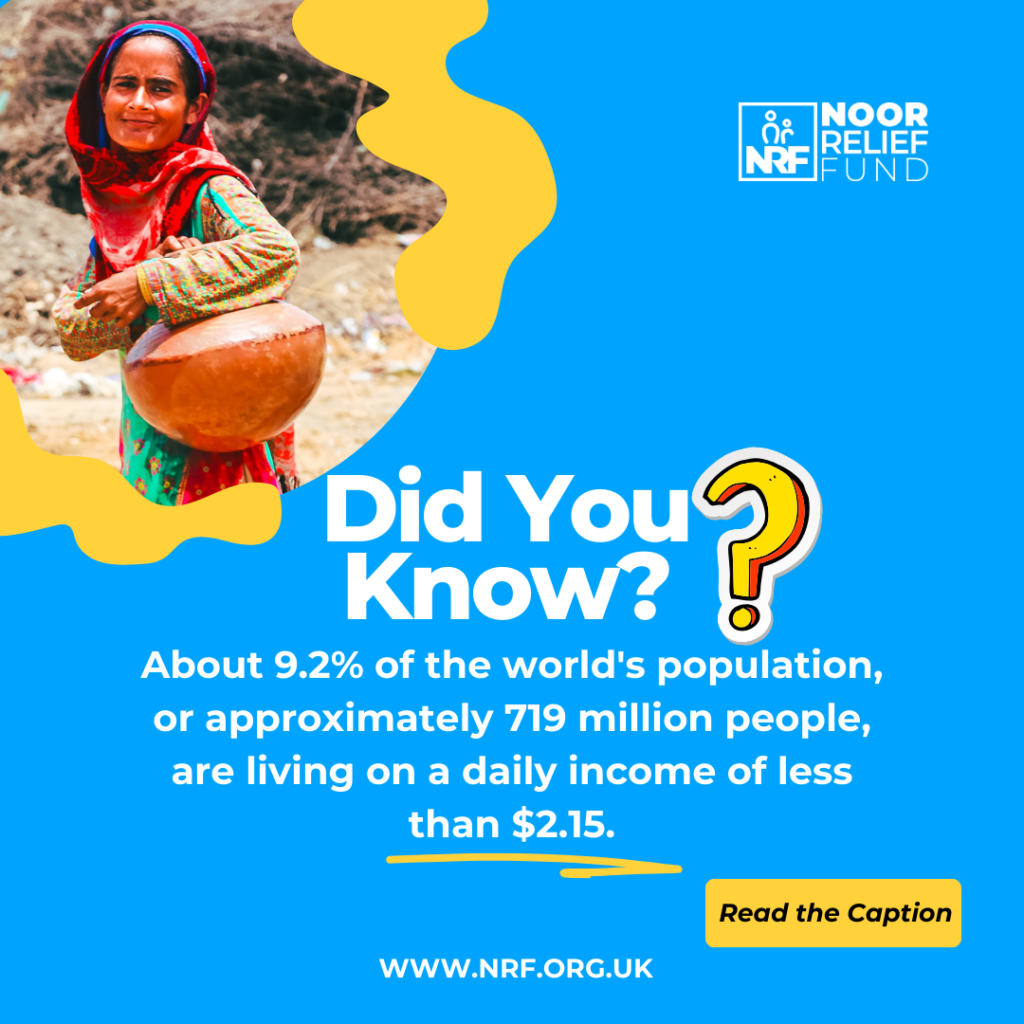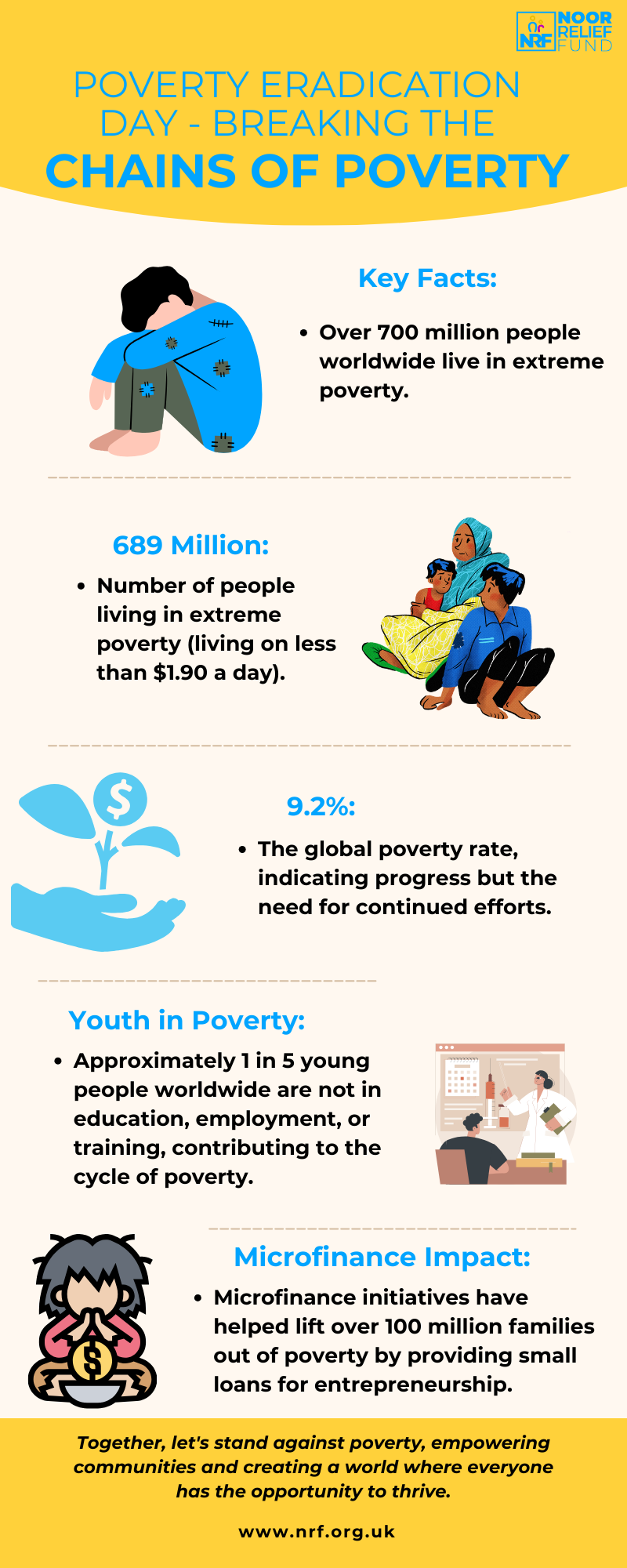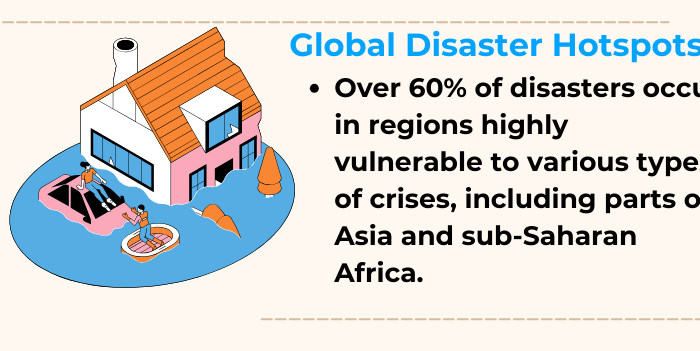Poverty is a global issue that affects billions of people, transcending borders, cultures, and socioeconomic statuses. It deprives individuals and families of basic human rights, including access to food, clean water, education, and healthcare. In response to this pressing problem, the United Nations established the International Day for the Eradication of Poverty, observed annually on October 17th. This day serves as a rallying point for communities, organizations, and governments worldwide to come together, reflect on progress made, and renew their commitment to eradicating poverty in all its forms.

What is the International Day for the Eradication of Poverty?
The International Day for the Eradication of Poverty, observed annually on October 17th, is a global initiative aimed at raising awareness and mobilizing efforts to combat poverty in all its forms. This day serves as a poignant reminder of the urgent need to address one of the most pressing issues of our time.
Established by the United Nations in 1992, this day is a global call to action for governments, organizations, and individuals to come together in the fight against poverty.
A Historical Perspective
The International Day for the Eradication of Poverty traces its roots back to 1987 when a group of activists gathered in Paris to honor the victims of extreme poverty, violence, and hunger. They called themselves “ATD Fourth World,” a non-governmental organization dedicated to eradicating poverty. Their efforts were eventually recognized on October 17, 1992, when the United Nations officially designated this date as a day to promote awareness and action against poverty.
Defining Poverty
Poverty, in its broadest sense, refers to a state of deprivation characterized by a lack of access to basic necessities such as food, shelter, clean water, education, and healthcare. However, poverty is not solely an economic issue. It also encompasses social, political, and cultural dimensions, perpetuated by systemic inequalities, discrimination, and exclusion.
The Global Scope of Poverty
The scope of global poverty is staggering. According to the World Bank, in 2020, nearly 9.2% of the world’s population lived on less than $1.90 a day, the international poverty line. This amounts to over 700 million people struggling to meet their most basic needs. Poverty is not confined to any one region; it is a pervasive issue affecting individuals in both developing and developed nations.
Root Causes of Poverty
Understanding the root causes of poverty is essential in developing effective strategies for eradication. While the factors contributing to poverty are complex and multifaceted, they can be broadly categorized into structural, systemic, and individual determinants.
Structural Determinants: These include policies, economic structures, and societal norms that perpetuate inequality. Lack of access to education, healthcare, and job opportunities are all structural barriers that hinder individuals and communities from breaking free from the cycle of poverty.
Systemic Determinants: Systemic factors encompass issues like discrimination, corruption, and political instability. Discrimination based on race, gender, or social class can lead to unequal distribution of resources and opportunities, exacerbating poverty.
Individual Determinants: These factors relate to personal circumstances and choices, but they are often influenced by the larger social and economic environment. Factors such as health, education level, and family structure can significantly impact an individual’s ability to escape poverty.

The Role of Education in Poverty Eradication
Education is a powerful tool in the fight against poverty. It empowers individuals with knowledge, skills, and critical thinking abilities, enabling them to access better job opportunities and improve their quality of life. Furthermore, education fosters civic participation, leading to informed and engaged citizens who can advocate for policies that address the root causes of poverty.
The Importance of Multifaceted Approaches
Eradicating poverty requires a multifaceted approach that addresses the various dimensions of this complex issue. This includes implementing policies that promote economic empowerment, ensuring access to quality education and healthcare, and actively combating discrimination and exclusion.
Community Empowerment and Grassroots Movements
Community empowerment plays a crucial role in poverty eradication. Grassroots movements, led by individuals and communities affected by poverty, are instrumental in creating sustainable change. They mobilize resources, advocate for policy reforms, and provide vital support to those in need.
Why Eradicating poverty is Important?
1. A Global Crisis
Poverty remains a pervasive and deeply entrenched problem affecting billions of people worldwide. It denies individuals access to basic human rights such as education, healthcare, and adequate nutrition.
2. Inequality and Social Disparities
Eradicating poverty is pivotal in reducing inequalities within and between countries. It is a critical step towards creating a more inclusive and just society.
3. Economic Stability and Growth
Poverty reduction fosters economic stability and sustainable development. By empowering individuals and communities, nations can unlock their full potential for growth and prosperity.
How the International Day for the Eradication is it Observed?
1. Activities and Campaigns
Every year, various activities, including seminars, conferences, and community outreach programs, are organized to raise awareness about poverty and mobilize support for anti-poverty initiatives.
2. Theme-based Approach
Each year, the day is marked by a specific theme, reflecting the evolving challenges and strategies in the battle against poverty.
Are We Making Strides? Navigating Triumphs and Trials in the Fight Against Poverty
Over the years, concerted global efforts have yielded progress in poverty reduction. Many regions have seen improvements in access to education, healthcare, and economic opportunities. You can see what Noor Relief Fund is doing for breaking the poverty cycle by visiting this page. Despite the progress, challenges persist. Inequality, climate change, conflicts, and the COVID-19 pandemic have exacerbated poverty in various parts of the world.
How You Can Contribute
Individuals can make a difference by supporting local and international organizations working towards poverty eradication, advocating for policy changes, and promoting awareness through social media and community initiatives.
The International Day for the Eradication of Poverty serves as a poignant reminder that poverty is not an insurmountable fate, but a challenge that can be overcome through collective effort, compassion, and dedication. By recognizing the multidimensional nature of poverty and addressing its root causes, we can create a more inclusive and equitable world where every individual has the opportunity to thrive. Together, we can build a future free from the shackles of poverty, ensuring that no one is left behind.
You can know more about International Day for the Eradication of Poverty on this United Nations website.




Wonderful
I like the issue and i want to be part of it
Support us with something to survive until the next harvest in June 2024 and support us with something which can help us to plant from January to April 2024 that could help us to go out from the precarity and the hunger.
Can you send the help by Western Union
At Fungurume/Equity -BCDC Bank
At Mr Kiebo Mwanza Floribert
Avenue de la Mission
Bloc 4/Quartier Kelangile
Commune de Fungurume
Province du Lualaba
Dr of Congo
Thanks on advance.
Please.
@floribertkiebo on Instagram ask you for the help to leave from precarity.